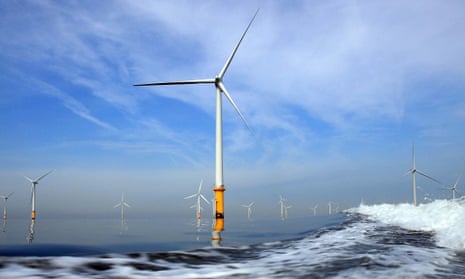As is frequent in the energy debate, the issues of cost and keeping the lights generate all the heat, but the crucial third horn of the trilemma the UK finds itself on - cutting carbon emissions - is largely overlooked.
Affordability and security are clearly vital, but also much discussed, so I'm going to consider what the launch of competition enquiry into the UK's dominant big six energy companies means for low carbon energy. Tackling the hopelessly conflicted big six is, I think, good news for those wishing to see a clean, sustainable energy system fit for the 21st century.
First, let me dismiss the idea that cutting the carbon from energy generation is an optional extra. Climate change is right here, right now: global warming doubled the risk of severe floods in England as far back as 2000. Second, it's the law: the UK is legally committed to cutting its emissions.
So why will the competition enquiry help deliver the renewable energy and energy efficiency we need? Because it can loosen the stranglehold the big six have on the UK's energy system, both on the ground and politically. Here's five ways in which the inquiry may prise the big six's fingers away:
- Breaking up vertical integration – the murky, impenetrable world where a big six company generates energy, then sells it to its own retail arm at an unknown price – will open the market for new generators.
- Big six companies are good at delivering big, centralised, dirty energy projects. But a sustainable energy future requires a significant part of supply to come from smaller, decentralised, clean projects. Opening up space for smaller generators will help drive those renewable and energy saving schemes. Those smaller generators will also be far better at engaging local communities, rather than alienating them as the big six usually have.
- The competition enquiry may add to the uncertainty in the energy sector and slow investment, but only really for the big six. Smaller players, those minister Greg Barker likes to call the big 60,000, will see more likelihood of being able to access the market. According to Stephen Fitzpatrick, CEO of Ovo Energy: “It is likely we will see a much more dramatic shakeup of the sector now and that can only be good news for energy customers and the industry as a whole."
- Energy companies make money from selling energy. The big six claim they want to help customers save energy. The hollowness of that is demonstrated by how the big six bullied David Cameron into getting cutting the “green crap” levies on bills. The result is 400,000 homes will now face higher bills as they will not get the energy saving measures they would have.
- Energy companies are always quick to raise the spectre of the lights going out and it's easy to understand why: it's a scary way of reminding politicians to do what the big six tell them. But energy prices are highest when supply is most stretched. If the lights ever did get close to going out, the big six would rake it in. The reason why the margin between capacity and peak demand is getting so narrow is because the big six have mothballed or postponed power stations until the prospective profits get juicy enough.
But, I hear some of you say, big six member SSE said its price freeze, announced on Wednesday, is being paid for in part by dumping a series of offshore wind farms. It's true that SSE is not proceeding with those projects, but why believe the reason given by a company who claimed just a few months ago that a price freeze would kill their retail business? Furthermore, they will sell their stakes (mostly 50%) in those offshore wind farms. The good ones will still get built. Another fact questioning its credibility is why it should only freeze prices when, as analyst Peter Atherton and others have pointed out, wholesale costs have fallen recently.
The regulator Ofgem, which instigated the inquiry, actually argues it will remove uncertainty from the energy market by clearing the air “once and for all clear” and even big six boss Tony Cocker, at E.on, said: “A full market investigation is the only way to restore full public confidence to the energy sector and depoliticise the whole issue.”
Ronan O'Regan, a director in PwC's Energy practice said: “The Competition and Markets Authority powers are far reaching and could, if used, create radical change in the current market structures."
And that's the crux: the transition from old, dirty energy to new, clean energy requires disruption. Disrupting the big six - that currently has 95% of the retail market - is the only place to start.

Comments (…)
Sign in or create your Guardian account to join the discussion